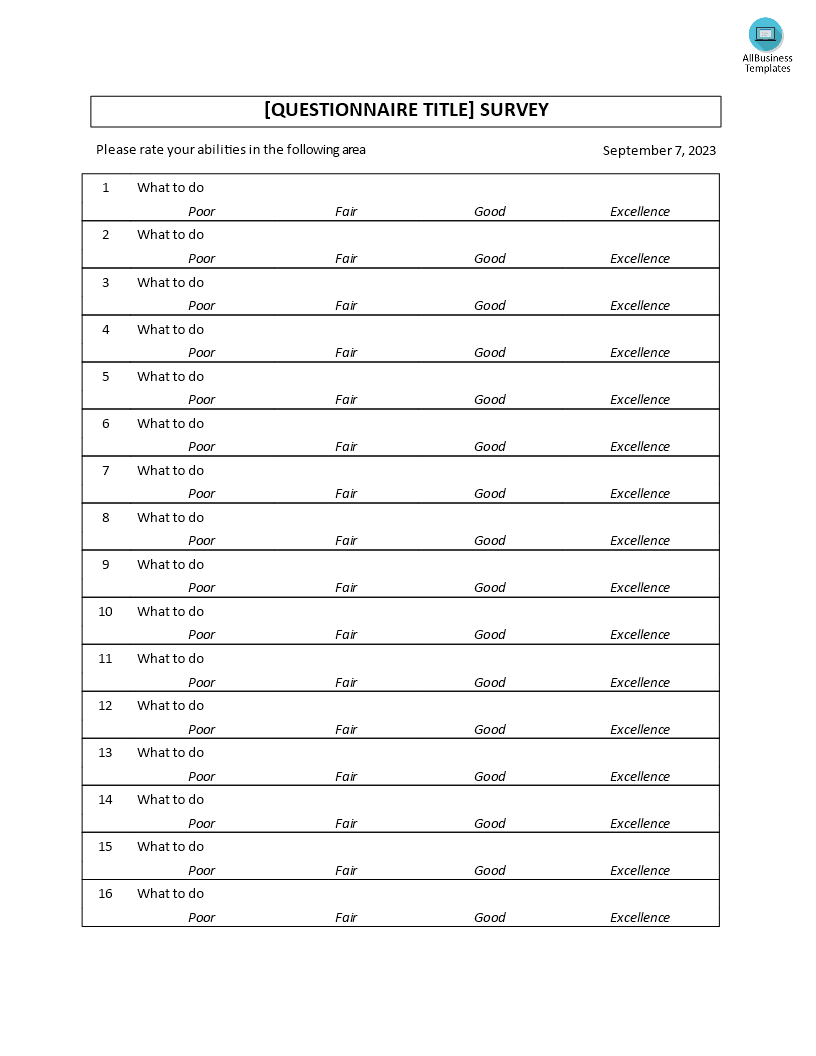Questionnaire Checklist
Save, fill-In The Blanks, Print, Done!

Download Questionnaire Checklist
Microsoft Word (.doc)Or select the format you want and we convert it for you for free:
- This Document Has Been Certified by a Professional
- 100% customizable
- This is a digital download (41 kB)
- Language: English
- We recommend downloading this file onto your computer.
Have you been searching for checklist templates for questionnaires? Do you want tips on how to use the questionnaire checklist? Download this template and answer the questions to get started. Make sure your questions are clear and specific. Consider adding a rating scale for each question.
A Questionnaire Checklist is a document or tool used to ensure that a questionnaire is properly designed, structured, and ready for use. It serves as a systematic guide to review the various elements of a questionnaire to enhance its effectiveness in collecting the desired information. Questionnaire checklists are commonly used in survey research, data collection, and market research projects.
Here are the key components typically included in a questionnaire checklist:
- Title and Introduction:
- Is the title clear, concise, and descriptive of the questionnaire's purpose?
- Does the introduction provide context and explain the purpose of the questionnaire?
- Are any instructions or explanations for respondents included?
- Question Clarity and Wording:
- Are questions clear and easily understandable by the target audience?
- Are technical terms or jargon explained when necessary?
- Are questions free from ambiguity and potential for misinterpretation?
- Are open-ended questions structured properly to elicit meaningful responses?
- Question Sequence and Logic:
- Is there a logical flow to the questions?
- Do questions progress from general to specific?
- Are demographic questions (e.g., age, gender) placed at the end of the questionnaire?
- Are skip patterns (conditional questions) correctly implemented?
- Response Options:
- Are response options for closed-ended questions exhaustive and mutually exclusive?
- Are response scales appropriate for the type of data being collected (e.g., Likert scale, multiple-choice, yes/no)?
- Are response options balanced and unbiased?
- Are "Don't Know" or "Not Applicable" options provided when appropriate?
- Length and Complexity:
- Is the questionnaire an appropriate length for respondents to complete within a reasonable time?
- Have unnecessary or redundant questions been removed?
- Are there too many open-ended questions that may increase respondent burden?
- Layout and Formatting:
- Is the questionnaire well-organized with clear headings and subheadings?
- Are questions presented in a readable font and size?
- Are response options neatly aligned and formatted?
- Piloting and Pretesting:
- Has the questionnaire been piloted or pretested with a small sample of respondents to identify issues and make necessary revisions?
- Consistency and Relevance:
- Do questions align with the research objectives and hypothesis?
- Are all questions necessary to achieve the study's goals?
- Are questions consistent in their approach and wording?
- Sensitivity and Ethics:
- Are there any potentially sensitive or invasive questions that should be handled with care?
- Is informed consent or a confidentiality statement included?
- Scoring and Data Handling:
- If applicable, is a clear scoring system defined for calculating scores from responses?
- Are data handling procedures (e.g., data entry, coding) clearly outlined?
- Testing and Technical Considerations:
- If the questionnaire will be administered electronically, have technical considerations (e.g., compatibility with survey software) been addressed?
- Review and Approval:
- Has the questionnaire been reviewed and approved by relevant stakeholders, such as supervisors, experts, or ethics committees?
A well-structured questionnaire checklist helps ensure the quality and reliability of data collected through surveys or questionnaires. It assists researchers and survey designers in creating effective instruments for gathering information and insights from respondents.
Download this sample questionnaire checklist on our website and fill it out with your team. Then, discuss the results and any points of improvement you can identify. Make sure to address each area of improvement and keep track of your progress.
DISCLAIMER
Nothing on this site shall be considered legal advice and no attorney-client relationship is established.
Leave a Reply. If you have any questions or remarks, feel free to post them below.
Related templates
Latest templates
Latest topics
- Excel Templates
Where do I find templates for Excel? How do I create a template in Excel? Check these editable and printable Excel Templates and download them directly! - GDPR Compliance Templates
What do you need to become GDPR compliant? Are you looking for useful GDPR document templates to make you compliant? All these compliance documents will be available to download instantly... - Google Docs Templates
How to create documents in Google Docs? We provide Google Docs compatible template and these are the reasons why it's useful to work with Google Docs... - IT Security Standards Kit
What are IT Security Standards? Check out our collection of this newly updated IT Security Kit Standard templates, including policies, controls, processes, checklists, procedures and other documents. - Letter Format
How to format a letter? Here is a brief overview of common letter formats and templates in USA and UK and get inspirited immediately!
cheese

